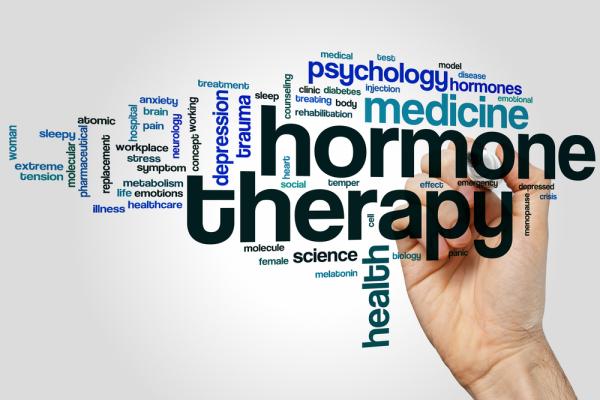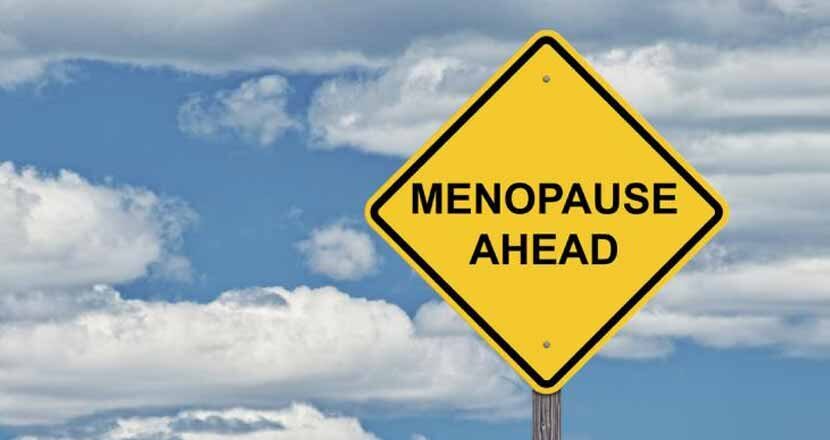Oprah Winfrey once shared: “So many women I’ve talked to see menopause as an ending.
But I’ve discovered this is your moment to reinvent yourself after years of focusing on the needs of everyone else.
It’s your opportunity to get clear about what matters to you and then to pursue that with all of your energy, time, and talent.”
While more women nearing, or, who have gone through menopause feel the same way as Oprah does.
Many women continue to feel anxious the minute they suspect that their symptoms of menopause have begun.
It’s okay to be worried but, know that in most cases, this anxiety is tapered off given the right information and with raised awareness about this defining moment in every woman’s life.
The Turning Point:

Menopause its turning point – Image/Shutterstock
Many people do not realize that there are several stages of menopause and that it can occur at different ages among different women.
Some simply get it sooner while others enter menopause later.
According to data reported by the Center for Disease Control and Prevention, most American women reach menopause between 45 to 55 years old.
Since menopause is not the only phase of menopause you should be concerned about.
Below is a quick rundown of what to expect in the 3 stages of menopause.
Three Stages of Menopause.
Stage 1: Perimenopause:
At this stage, you begin noticing marked changes in your menstrual cycle and the intensity of flow.
It becomes normal that your period becomes shorter one month then, longer in others, no matter how regular you may have been experiencing your periods in previous years.
Many women begin to notice lighter bleeding.
This is the stage when your estrogen and progesterone production levels begin to fluctuate and begin to drop — the root causes of menopause.
Symptoms such as irritability, mood swings, and night sweats can begin to set in at any time during this stage.
There are conditions that can increase the likelihood of early onset of the three stages of menopause.
Increased risks for premature menopause can be driven by ovarian failure, related medical conditions, surgery including hysterectomy (removal of the uterus) and oophorectomy (removal of the ovaries), and poor lifestyle choices, among the most studied of which is the relation of smoking and early menopause.
In a study published in the Journal of Epidemiology in 2017, researchers compared the risks of never-smokers, quitters, and current smokers to establish a relationship between smoking and early menopause.
The researchers observed that never-smokers showed a lower risk for early menopause compared with women who currently smoke.
A marked higher risk was observed among quitters compared to never-smokers.
The study also highlighted that women who smoked less than 10 sticks daily but quit before or at age 25 appeared to have the same low level of risk as never-smokers.
In another study published in the Menopause Journal in 2015, researchers observed women exposed to cigarette smoke at three points of their lives, that is, during prenatal, childhood, and adulthood.
The study involved 1,001 women aged 39-49.
The researchers concluded that accelerated ovarian aging, a root cause for early onset of menopause, was observed among women prenatally exposed to cigarette smoke, and among those who are exposed to cigarette smoke around the age of menopause.
Stage 2: Menopause:
This stage is clearly marked by your last period and the 12 months that follow with continuously missed menstruation will confirm your entry into this stage.
As you near this stage and in the months immediately following, you can expect your body to go through major changes and adjustments.
Signs of Perimenopause and Menopause Stages are often similar, that includes increasing lack of focus, breathlessness, frequent feelings of feeling fatigued, sleeplessness, vaginal dryness, menopausal weight gain, and lack of sex drive.
As you enter menopause, these symptoms tend to intensify as your sex hormones reach an all-time low.
Health-wise, your risks of developing degenerative diseases like osteoporosis, as well as lifelong cardiovascular conditions and hypertension also increase.
The menopause-brain connection has been debated for decades.
Recent studies have been able to make some convincing arguments.
Among which is a study undertaken in 2012 by researchers from Harvard and Emory University.
The researchers concluded that the lower levels of estrogen among women limit their ability to cope with fear caused by traumatic events, making them more vulnerable to anxiety and depression.
could help explain why menopausal women go through bouts of emotional insecurity during menopause.
Stage 3: Post-Menopause:
This is the period when your body will have started to cope with the major changes that lower levels of estrogen and progesterone in your body will have caused at this stage.
Nevertheless, the onset of menopause increases a woman’s risk for many degenerative diseases as a result of compromised blood and fluid circulation, inefficient blood clotting, indigestion, and poor metabolism.
Most women would begin complaining about palpitations, nervousness and shaking, painful joints, even acne after menopause, and difficulties performing mundane activities, including walking.
Cry For Help:
Don’t hesitate to ask for help at any point during menopause where you might feel you require a boost to help you cope with the many changes that your body and mind are going through before, during, and after menopause.
Talk to a health professional about the many ways to control menopause symptoms and, more importantly, seek out the support of your spouse and other loved ones who are going through these stages of menopause.
You may also like: Menstrual Cramps after Menopause: Things You Can Do To Avoid This Pain
Listed below are the top 3 ways to help you cope with the symptoms of menopause so that you can be healthier, happier, and enjoy life after menopause:
3 Ways to help you cope with the Symptoms of Menopause
1. Make Significant Changes To Your Lifestyle:

Change your lifestyle – Image/Shutterstock
Any guide to menopause and perimenopause that has ever been written will recommend that you take a truthful evaluation of your current lifestyle and make a major revamp when and where necessary.
Regular physical activity is of premium importance to maintain a healthy circulation but also to promote bone and joint health.
Eating nutritious food during the menopause stages can do tons in improving your symptoms, including regulating your mood swings, as well as decreasing your generally increased risk for developing degenerative diseases.
One area related to the proper diet for women in menopause that has seen plenty of contradicting arguments is the consumption of phytoestrogens.
Studies have argued about the beneficial impact of phytoestrogenic foods such as soy beans, lentils, barley, and flaxseeds in easing the symptoms of menopause.
Phytoestrogens refer to plant-derived estrogens that help make up for the dwindling volume found in the body of a woman going through menopause.
These foods have been praised for helping relieve symptoms such as mood swings, lack of focus, and lack of sex drive.
On the contrary, other studies have shown how phytoestrogens increase a woman’s risks for developing dementia which demonstrates the degenerative effect of phytoestrogens to otherwise normal brain functions, and the growth of cancerous tumors on the breast, leading to breast cancer.
2.Inquire About Hormone Replacement Therapy (Hrt):

Hormone Replacement Therapy – Image/Shutterstock
There was a period in the 1980s to the early ’90s when HRT has become an automatically recommended course of menopause treatments for women reaching the age of menopause.
The trend quickly took a turn when the Women’s Health Initiative (WHI) published the results of a study highlighting the long-term effects of HRT to women’s health.
The study showed that HRT significantly increased a menopausal woman’s risk for developing breast cancer and cardiovascular diseases.
Since then, women and health professionals have been seeking alternative treatments, including the intake of vitamin supplements during the menopause stages.
Nevertheless, HRT continues to be highly recommended on a case-by-case basis, and only when administering HRT clearly delivers more advantages that outweigh the risks.
That’s why it is important that you have a more in-depth discussion with a medical professional about it.
3. Consider Menopause Supplements:

Menopause Supplements – Image/Shutterstock
The worldwide fears for the irreversible risks posed by HRT have prompted women, medical professionals, and manufacturers alike to seek alternatives.
Presently, these alternative treatments have been derived from botanical sources.
In general, ingredients in menopause supplements are of two types:
- Phytoestrogenic
These are supplements that attempt to introduce external sources of estrogen and/or progesterone into your system to help make up for the dwindling and sharp drop in the production of these reproductive hormones.
These, in turn, help normalize the body activities that estrogen and progesterone help control and regulate, which includes your brain activity, bone development, and fertility, among many others.
- Non-phytoestrogenic. Some of the best menopause supplements are simply made from plant sources that are based on centuries-old traditions of treatment and care for women going through the different stages of menopause.
Some of the best Phytoestrogenic menopausal supplements are MenoRescue & Giddy + Health Menopause Support.
FAQ’s:
Que: What are the symptoms of perimenopause?
Ans: The Signs of Perimenopause
- Hot flashes.
- Breast tenderness.
- Worse premenstrual syndrome.
- Lower sex drive.
- Fatigue.
- Irregular periods.
- Vaginal dryness; discomfort during sex.
- Urine leakage when coughing or sneezing.
Que: What are the first signs of perimenopause?
Ans: The symptoms of perimenopause
- Irregular periods or skipping periods
- Periods that are heavier or lighter than usual
- Hot flashes
- Vaginal dryness and discomfort during sex
- Urinary urgency
Que: When does perimenopause start?
Ans: Perimenopause can begin in some women in their 30s, but most often it starts in women ages 40 to 44.
Que: What are the stages of menopause?
Ans: Three stages of menopause: perimenopause, menopause and postmenopause.
- Perimenopause is the time leading up to menopause.
- Menopause occurs when you’ve stopped producing the hormones that cause your menstrual period.
- Postmenopause is the time after menopause has occurred. Once this happens, you’re in postmenopause for the rest of your life.
Conclusion:
Medical science has a long way to go when it comes to developing sure-fire ways of easing the difficult symptoms experienced by women throughout the different phases of menopause.
Women are trying to cope, including with the help of supplements.
The fact remains, however, that supplements are not regulated and claims are not subject to testing and screening.
Nevertheless, you should listen more closely to your body, and seek help and support to help you go through menopause with grace, poise, and good health.
 By Wendy Gould
By Wendy Gould





